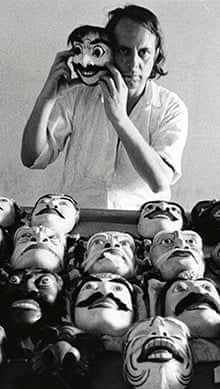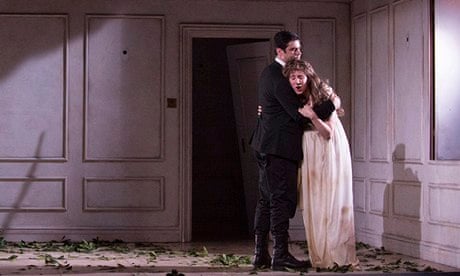Francesco Cavalli's Jason, a riot of theatrical decadence and musical excess with scant sign of the golden fleece or any Argonauts, was the single most popular opera of the 17th century. Today it remains near the back of the repertoire cupboard unless you happen to be a baroque addict, in which case, as one friend in that select category pointed out, Giasone is rarely "off the turntable" – which puts some of us in our place.
English Touring Opera, in their new season of predominantly Venetian music, has pared the work down to little over two hours, translated it into English and made it easily comprehensible to a modern audience. Purists beware. The original plot is a switchback of adultery, bigamy, false drownings and unlikely rescues. Several of these extraneous loops have been excised. The comic male nurse survives, and the stuttering hunchback has been rid of one of his disabilities and merely stutters. Vitally, the expressive power of this glorious music shines through.
The director Ted Huffman and designer Samal Blak have given a clean, modern look to a panelled Venetian interior, complete with chandelier and plenty of flickering candles (lighting by Ace McCarron). An uneven but acceptable cast, led by the countertenor Clint van der Linde in the sensuous, morally dubious title role, Hannah Pedley as Medea and Catrine Kirkman as her unwitting rival, Isiphile, gave engaging performances which made up for first-night imperfections.
The action mixes life's misadventures with metaphysics and witchcraft, and includes sleep arias, a mad scene and several heartfelt laments. Cavalli's gift is to spin these elements into drama of emotional immediacy. His music has an endless fluidity, swift and almost blinding in its rapid contrast. In this tragicomedy the darkest arias have raw intensity, with the dazzling, comic elements providing levity, compounding rather than undermining the emotions expressed.
The reunion of Jason and his wronged but faithful wife Isiphile unfolds with potent dignity. The tearing dissonances at this point were played with febrile ardour by ETO's period instrument orchestra the Old Street Band. The impact was indelible. Joseph McHardy conducted with spirit and idiom. Greater finesse will come, no doubt, during the company's 16-venue UK tour, when ETO also performs Monteverdi's The Coronation of Poppea and Handel's Agrippina, as well as Vivaldi's Music for a Venetian Orphanage.

The Southbank Centre's The Rest Is Noise series exploded into life once more last weekend with two full days devoted to music of the postwar world. Old hippies, who had perhaps been one of the tiny handful of audiences who heard these works decades ago, and young adventurers in search of novelty, flocked to the Queen Elizabeth Hall and Festival Hall for talks, sound bites and concerts. This instalment – of masterpieces from the 1950s – was the era of rejection. In the light of a transfigured Europe, composers sought new modes of expression, embracing electronics and serialism.
At the forefront, as they remained for the next three decades at least, were Karlheinz Stockhausen and Pierre Boulez. Their music was the focus of a sell-out concert by members of the Aurora Orchestra, with pianist-performer extraordinaire Nicolas Hodges and the formidable percussionist Colin Currie, who took ownership of Stockhausen's Kontakte (1958-60). That aural spectacle examining pulse in all its complexity, and which also exists in a yet more austere tape version, won thunderous cheers.
Boulez's Le marteau sans maître (1953-55) was the other musical icon from that period, a work of such radical invention that a generation of composers, among them Harrison Birtwistle, found the freedom to find their own voice as a result. Hilary Summers delivered René Char's texts with insouciance and a sense of marvel, despite the extreme vocal challenges. The expert ensemble was conducted with exactitude by Franck Ollu.
In one of those insoluble diary clashes, I missed a standing-ovation performance of Gruppen in favour of other sonic, and in this case visual, experiments: the London leg of a SoundUK tour in which pianist Joanna MacGregor and friends performed graphic scores by John Cage, Cornelius Cardew, George Crumb, Tom Phillips and others at LSO St Luke's. It proved an insightful footnote to The Rest Is Noise: old ideas of notation were here swept aside for the free interpretation of swirls, splodges, shapes, ornaments. If it was a short-lived movement, peaking in the 1970s, it captured the essence of those adventurous times.

The highest accolade for bravery all weekend must go to Tamara Stefanovich for a piano recital of Ligeti, Stockhausen, Messiaen and Boulez at the QEH. This dextrous wizard made light of Boulez's hardly playable Second Sonata, barely glancing at the score and pounding and caressing the piano fearlessly in a work which cast to the four winds all previous notions of sonata form. Stefanovich has an ability to find identity and meaning in each note, rolling it around and exploring its purpose, often at frenetic speed, as Boulez intended. She summed up the freshness of her approach when presented with her bouquet at the end. Not only did she walk off stage examining the flowers, she smelled them too, as if savouring every petal.
Star ratings (out of 5):
Jason ★★
The Rest is Noise ★★★★★

Comments (…)
Sign in or create your Guardian account to join the discussion